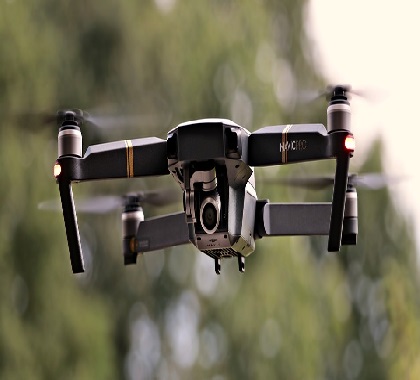The Illinois General Assembly approved a bill that would allow law enforcement personnel to use drones to observe certain public gatherings without obtaining permission from a judge.
State law currently requires police to obtain a search warrant from a judge before using drones to monitor public events such as concerts, sports events, and rallies. If signed into law by Gov. Bruce Rauner, Senate Bill 2562 (S.B. 2562) would exempt events attended by more than 100 people from this requirement.
The legislation has not yet been sent to Rauner for consideration. The Illinois state House and Senate passed S.B. 2562 in May.
‘A Slippery Slope’
Matthew Feeney, a policy analyst at the Cato Institute, says the proposed law would accustom people to being monitored by government, leading to further invasions of privacy.
“Police, under existing legislation, can use drones to counter a high-risk terrorist attack; they can also use drones if they obtain a warrant,” Feeney said. “Those kind of provisions would allow for police to use drones in the kind of instances where people would be supportive. What you really want to avoid is a situation where drone surveillance becomes the norm. It strikes me as a slippery slope that we shouldn’t even try to go down.”
Historical Trend
Nathan Sheard, a grassroots advocacy organizer for the Electronic Frontier Foundation, says people with little political power have the most to lose from expansion of government surveillance.
“If we look at history, communities that have been most affected are those that are most marginalized and actually have the greatest need to be able come together and call for their rights to be respected,” Sheard said. “These gatherings are not just in protest; it’s [also] people that are coming together in religious gatherings.
“The potential threat is that people would fear gathering for any reasons,” Sheard said. “The threat is that the people who are the most marginalized will be further deterred from getting together and calling for justice or expressing their religious viewpoints.”
‘We Should Be Very Wary’
Feeney says people should not trade away the right to assemble peaceably without government watching their every move.
“There are obvious gatherings where people have security concerns, such as sporting events and music concerts,” Feeney said. “We should keep in mind that these large-scale events include activities that are protected by the First Amendment, specifically protests and religious gatherings. We should be very wary about the kind of surveillance that we deploy, when it hampers people from exercising their First Amendment rights.
Whatever increases in security may come from expanded police reconnaissance is not worth the loss of liberty, Feeney says.
“I think that if you allow for warrantless drone surveillance over large groups of people, you will quickly arrive at a situation where the costs outweigh the benefits,” Feeney said. “Security is the reason that lawmakers always like to cite when they’re considering giving police more surveillance powers. You can imagine a situation where a drone over a large group of people maybe could have contributed to a law enforcement investigation. You can always imagine a situation where extra surveillance could have helped, but just because we can do something, we [still] have to ask whether we should.”
‘Those Are Essential Protections’
Sheard says the defense of individual liberties against government infringement is vital.
“It’s important that folks who believe in the protections that are provided for us—in the First Amendment, the Fourth Amendment, and the Bill of Rights—continue to make sure we’re standing together and make sure we’re not giving up those rights,” Sheard said.
“People have fought for years maintain those protections because they’re essential,” Sheard said. “If we believe in liberty, if we believe in freedom, those are essential protections that we must not take for granted and should continuously make sure they aren’t being threatened.”




